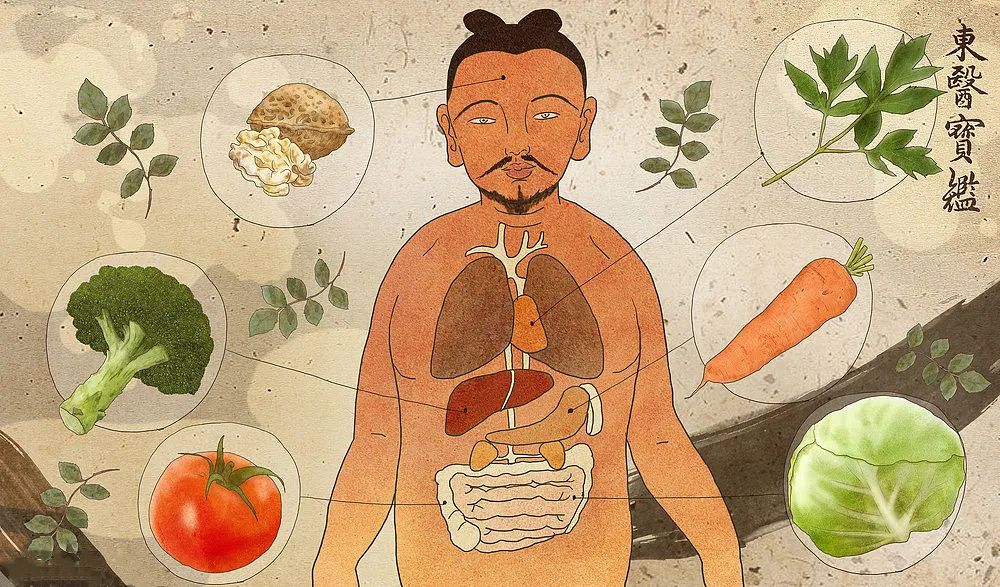
Traditional Chinese Medicine (TCM) posits that the five fluids—tears, sweat, saliva, nasal mucus, and saliva—correspond to the five internal organs. This is elaborated in the “Su Wen: On the Five Qi” which states: “The five organs transform fluids: the heart corresponds to sweat, the lungs to nasal mucus, the liver to tears, the spleen to saliva, and the kidneys to saliva.” This means that the state of these fluids can indicate the health of your internal organs. Are you 100% healthy?
Tears: The Fluid of the Liver

The liver opens to the eyes; when the liver blood and fluids are abundant, they overflow into the eyes as tears. Tears can moisten the eyes, and any abnormalities in tears can indicate liver issues.
Insufficient tears leading to dry eyes indicates a deficiency of liver yin and blood, suggesting the need to nourish the liver and blood. Avoid anger and focus on gentle nourishment.
Experiencing tears in the wind or itchy eyes indicates that the liver meridian is affected by wind pathogens; it is advisable to reduce eye strain and maintain cleanliness, possibly using wild chrysanthemum or mulberry leaves for steaming and washing. Sticky tears and light-sensitive pain indicate heat in the liver meridian; using a cotton swab dipped in water to wipe the tear sac several times a day can help.
Avoid spicy and irritating foods, and ensure smooth bowel movements to allow heat pathogens to be expelled. Elderly individuals with weak qi and blood, or liver and kidney yin deficiency, may experience persistent tearing. It is recommended to nourish the liver and kidneys, tonify qi and blood, enhance nutrition, and moderate sexual activity.
Sweat: The Fluid of the Heart

The secretion of sweat is physiologically controlled by the heart spirit; for instance, when feeling cold, the pores close and sweating ceases; conversely, in hot weather, during exercise, or when overdressed, the pores open and sweating increases.
Abnormal sweating primarily manifests as spontaneous sweating or night sweats. Insufficient heart yang or qi deficiency leads to spontaneous sweating, which requires tonifying qi and yang. Patients with yang deficiency often feel cold and are susceptible to wind-cold, thus indoor temperatures should be kept warm, and warming treatments should be applied.
Patients with qi deficiency should pay attention to rest; a decoction of 5 jujubes, 30 grams of black beans, and 60 grams of astragalus boiled in 150 milliliters of water, taken twice daily, is recommended, along with maintaining regular daily routines.
Individuals with insufficient heart yin and blood are prone to night sweats; their diet should focus on gentle nourishment, avoiding spicy foods such as lamb, chili, ginger, and scallions. Night sweats often occur in those with a hot and dry constitution, so a cooler and more humid environment is advisable.
Saliva: The Fluid of the Spleen

The spleen opens to the mouth; the yin essence of the spleen is distributed to the mouth, resulting in saliva, which primarily aids in dissolving food and assisting digestion.
Individuals with spleen and stomach weakness may experience a bland taste in the mouth, nausea, and excessive saliva, indicating the need to warm the middle and strengthen the spleen. Avoid cold and overly hot foods, and apply heat to the stomach area; ginger soup or glutinous rice porridge with several red dates can be consumed.
Excessive stomach fire may lead to dry mouth and reduced saliva; such individuals should avoid spicy and irritating foods, and consume more fruits, fresh vegetables, and cooling beverages. Using ophiopogon and adenophora decoction is also beneficial.
Nasal Mucus: The Fluid of the Lungs

The lungs open to the nose; when lung fluids are abundant, they flow from the nasal passages as mucus. Nasal mucus can moisten the nasal passages, keeping them clear and ensuring normal respiratory and olfactory functions.
Abnormalities in nasal mucus can indicate lung issues. For instance, lung yin deficiency may present as dry nasal passages with little mucus; it is advisable to lower indoor temperatures and maintain humidity. A decoction of 50 grams of tremella, 30 grams of lily, 30 grams of adenophora, and a spoonful of honey, simmered for half an hour, can be taken twice daily. Avoid spicy and fried foods.
Wind-cold affecting lung qi may lead to clear nasal discharge. Individuals in this condition should ensure fresh air indoors while avoiding further exposure to wind-cold. Chinese medicine should be taken warm, and after taking medicine, resting under a blanket or consuming hot porridge can help dispel cold. Those with yellow and turbid nasal discharge should clear lung heat; Chinese medicine should be taken cool or slightly warm, and a diet focusing on cooling and nourishing foods should be maintained, ensuring nasal passages remain clear.
Saliva: The Fluid of the Kidneys

Strong kidney qi leads to the upward flow of kidney yin essence to the mouth, resulting in saliva, which moistens the mouth and aids in food dissolution.
Abnormal changes in saliva can reflect kidney issues.
Bitter mouth, dry mouth, and little saliva, along with weakness in the lower back and knees, indicate liver and kidney yin deficiency; decoction of goji berries and adenophora is recommended. Additionally, emotional regulation, rest, and avoiding spicy and irritating foods, as well as tobacco and alcohol, are advised.
Excessive saliva or clear saliva indicates the need to warm yang and promote fluid metabolism. It is advisable to maintain a regular lifestyle, prevent external pathogens, keep the skin clean, and consume light and easily digestible foods.
-End of Document-
Note: The various prescriptions and formulas mentioned in this article are for reference and learning purposes for professional TCM practitioners only and should not be used as prescriptions. Non-professionals should not attempt to use them blindly. This platform does not bear any responsibility for any consequences arising from such actions!© Beijing Zhongfang Mingyi Clinic

Long press the WeChat QR code below to follow us

WeChat ID|zfyy1057
Please indicate the source when reprinting
Some content is sourced from the internet, and copyright belongs to the original author
If interested, please click the lower right corner, there is something for youto see

